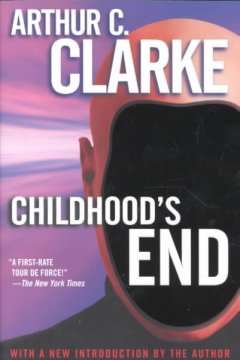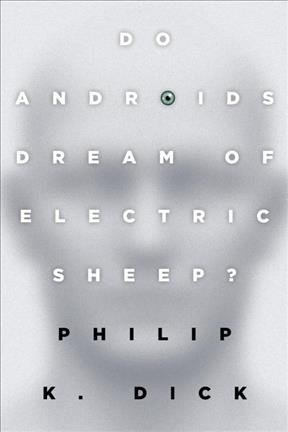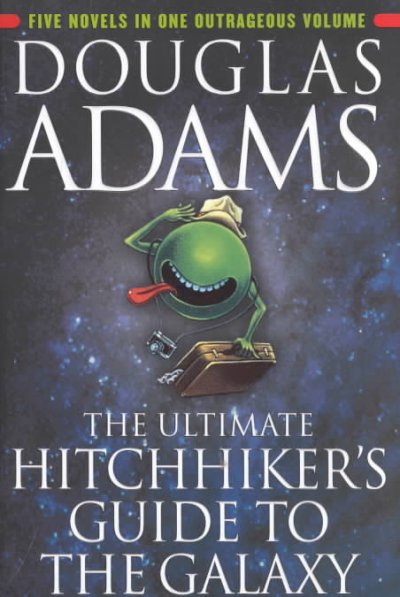Today, it would be difficult to find a movie or television show that does not incorporate some kind of science fiction element. Inspired by this, many people now seek to experience the genre at its source: books. However, with such an overwhelming number of classic science fiction books, where should someone start? This is a question that customers have asked me before, and here is my answer: Here are three books that you can find on our shelves that I think are perfect examples of classic science fiction.
Childhood’s End by Arthur C. Clarke
 To those who have heard his name, Arthur C. Clarke is most well-known as the co-creator of the book and subsequent film 2001: A Space Odyssey. However, his influence does not stop at cinema. Clarke’s theories in his books about satellites and orbits actually came to fruition in reality, so much so that a geosynchronous orbit used by telecommunications satellites is named after him (The Clarke Belt). My personal favorite work of his is Childhood’s End, a story of mankind’s first encounter with extraterrestrials and the effects that span hundreds of years. The story begins with a simple premise: massive alien ships suddenly appear on Earth, hovering over major cities, doing nothing. It’s an iconic enough image to spawn several copycat stories and films, which I will not list here. Where it goes from there is a bit strange, but I won’t spoil it.
To those who have heard his name, Arthur C. Clarke is most well-known as the co-creator of the book and subsequent film 2001: A Space Odyssey. However, his influence does not stop at cinema. Clarke’s theories in his books about satellites and orbits actually came to fruition in reality, so much so that a geosynchronous orbit used by telecommunications satellites is named after him (The Clarke Belt). My personal favorite work of his is Childhood’s End, a story of mankind’s first encounter with extraterrestrials and the effects that span hundreds of years. The story begins with a simple premise: massive alien ships suddenly appear on Earth, hovering over major cities, doing nothing. It’s an iconic enough image to spawn several copycat stories and films, which I will not list here. Where it goes from there is a bit strange, but I won’t spoil it.
Do Androids Dream of Electric Sheep? By Philip K. Dick
 There has been a lot of debate as to which author is truly the quintessential sci-fiauthor, and nearly every one comes to the same conclusion. Philip K. Dick made massive contributions to the entire genre of Science-Fiction, molding it into what it is today. Many of PKD’s works have been adapted to film and television, though few know it. Total Recall, The Adjustment Bureau, Minority Report, The Man in the High Castle, and Blade Runner are all based on his works. Because of this, many people are more familiar with his stories than they realize. My favorite work of his is Do Androids Dream of Electric Sheep?, which was the basis for the film Blade Runner. It is a detective story at it’s heart, the story of Rick Deckard, a “Blade Runner,” a detective who specializes in identifying and decommissioning rogue androids. It’s an interesting take on the classic mystery novel, and I love it.
There has been a lot of debate as to which author is truly the quintessential sci-fiauthor, and nearly every one comes to the same conclusion. Philip K. Dick made massive contributions to the entire genre of Science-Fiction, molding it into what it is today. Many of PKD’s works have been adapted to film and television, though few know it. Total Recall, The Adjustment Bureau, Minority Report, The Man in the High Castle, and Blade Runner are all based on his works. Because of this, many people are more familiar with his stories than they realize. My favorite work of his is Do Androids Dream of Electric Sheep?, which was the basis for the film Blade Runner. It is a detective story at it’s heart, the story of Rick Deckard, a “Blade Runner,” a detective who specializes in identifying and decommissioning rogue androids. It’s an interesting take on the classic mystery novel, and I love it.
The Ultimate Hitchhiker’s Guide to the Galaxy by Douglas Adams.
 Douglas Adams was, for the most part, a humorist in the vein of Mark Twain, but his genre of choice was science fiction. His masterpiece, The Hitchhiker’s Guide to the Galaxy and its sequels, now published together as The Ultimate Hitchhiker’s Guide to the Galaxy, are the best example of his sharp wit and absurdist style of Adams’ work. The opening of the book features (spoiler alert, although it is the beginning of the book) the destruction of Earth, after which Adams writes “This planet has—or rather had—a problem, which was this: most of the people living on it were unhappy for pretty much all of the time. Many solutions were suggested for this problem, but most of these were largely concerned with the movement of small green pieces of paper, which was odd because on the whole, it wasn’t the small green pieces of paper that were unhappy.” The book is likely the one that I have reread the most, and in my mind, it is, not only one of the funniest novels, but one of the best ever written at all.
Douglas Adams was, for the most part, a humorist in the vein of Mark Twain, but his genre of choice was science fiction. His masterpiece, The Hitchhiker’s Guide to the Galaxy and its sequels, now published together as The Ultimate Hitchhiker’s Guide to the Galaxy, are the best example of his sharp wit and absurdist style of Adams’ work. The opening of the book features (spoiler alert, although it is the beginning of the book) the destruction of Earth, after which Adams writes “This planet has—or rather had—a problem, which was this: most of the people living on it were unhappy for pretty much all of the time. Many solutions were suggested for this problem, but most of these were largely concerned with the movement of small green pieces of paper, which was odd because on the whole, it wasn’t the small green pieces of paper that were unhappy.” The book is likely the one that I have reread the most, and in my mind, it is, not only one of the funniest novels, but one of the best ever written at all.


Comments are closed.